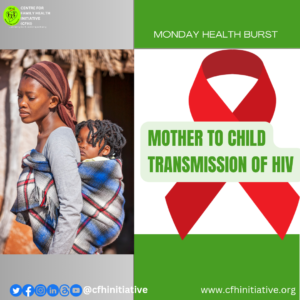Mother-to-child transmission (MTCT) of HIV remains a significant public health concern, posing a threat to the well-being of infants worldwide. Despite advances in medical science and increased awareness, preventing the transmission of the virus from mother to child remains a complex challenge that requires a comprehensive approach.
The World Health Organization (WHO) estimates that 1.3 million women and girls living with HIV become pregnant annually worldwide.
HIV can be transmitted from an infected mother to her child during pregnancy, childbirth, or breastfeeding. The virus can pass through the placenta, be present in the birth canal and maternal genital fluids during delivery, and can be present in breast milk. Each of these stages presents a risk of transmission, underscoring the need for targeted interventions.
Prevention Strategies:
Antiretroviral Therapy (ART): Initiating ART during pregnancy significantly reduces the risk of MTCT. This treatment helps control the viral load in the mother, minimizing the chances of transmission to the child.
Elective Cesarean Section: In cases where the mother’s viral load is high, opting for a cesarean section before the onset of labor can further reduce the risk of transmission.
Avoiding Breastfeeding: While breastfeeding is generally recommended for infant health, in the context of HIV, alternative feeding methods are often advised to eliminate the risk of transmission through breast milk.
Prevention of unintended pregnancies: Family planning services and education play a crucial role in preventing unintended pregnancies among HIV-positive women, contributing to better management and prevention of MTCT.
Preventing mother-to-child transmission of HIV requires a multifaceted approach that addresses medical, social, and economic factors. Continued research, education, and global collaboration are crucial to achieving the goal of an HIV-free generation. As we strive for an AIDS-free world, prioritizing the well-being of both mothers and children remains at the forefront of public health efforts. It’s essential for infected pregnant women to receive proper medical care and follow the guidance of healthcare providers to minimize the risk to their babies.
Monday Health Burst is an initiative of CFHI to address issues of basic health concern. Join us every Monday on all our social media platforms for more episodes.




